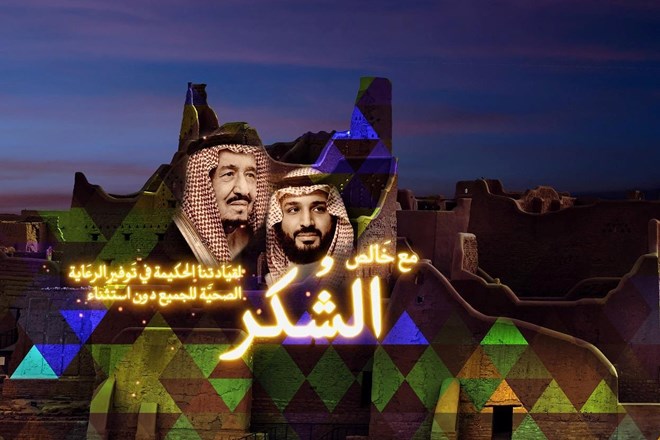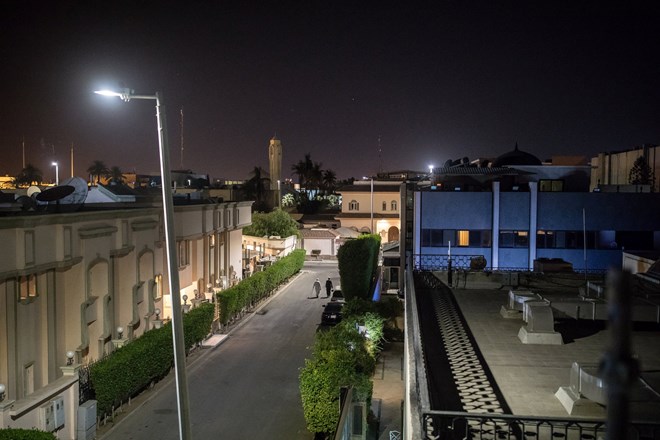
Sunday May 17, 2020
By Vivian Yee
The coronavirus pandemic and falling oil prices have yanked the rug out from under Crown Prince Mohammed bin Salman’s development plans and curbed government largess.

A message from the king and the crown prince, projected on Salwa Palace in Diriyah in April, asking Saudis to stay home during the coronavirus pandemic. Credit...Balkis Press/Abaca, via ZUMA
BEIRUT, Lebanon — Saudi Arabia knows about head-spinning change.
“One day there was nothing, the next day there was everything,” a business student, Noura Khalid, 23, said in Riyadh in December, describing how it felt to watch her once-staid country welcome international rap stars and wrestling champions, cars steered by women, movie theaters, gender-mixed cafes and other previously unimaginable innovations in just the last few years. “There’s no break! It’s happening so quickly.”
Now the kingdom faces yet more whiplash.
Not only is the coronavirus redefining daily life for Saudis, but plummeting oil prices are robbing the kingdom of the enormous wealth that was underwriting the new Saudi Arabia. The twin blows threaten to sink Crown Prince Mohammed bin Salman’s sweeping social and economic agenda, and have already curtailed the vast welfare state that has given most Saudis a comfortably subsidized life.
Prince Mohammed, Saudi Arabia’s de facto ruler, has upended his country out of a recognition that the kingdom could not keep living off oil forever. Alongside the social reforms have come swaggering moves to diversify the Saudi economy by building up tourism, entertainment and even a futuristic new city called Neom, under a grand scheme he called “Vision 2030.”
But with tourism canceled, concerts out of the question and oil prices crashing, a country that was jangling with nervous excitement a few months ago is confronting a very different future from the one Prince Mohammed had promised.
“I think Vision 2030 is more or less over,” said Michael Stephens, a Middle East analyst at the Royal United Services Institute in London. “I think it’s finished.”
Saudi Arabia, he said, was facing “the hardest time it’s ever been through, certainly the most difficult period of Mohammed bin Salman’s tenure.”
The crown prince has given no indication of scratching any specific plans, and his finance minister, Mohammed al-Jadaan, told Bloomberg News that projects such as Neom would simply be delayed.
Still, Saudis long accustomed to generous fuel and electricity subsidies, cushy government jobs and free education and health care may live far less comfortably than previous generations did, rewriting the relationship between Saudis and their rulers.
The government announced Monday that it would triple the country’s value-added tax on goods and services from 5 to 15 percent, strip a roughly $266 monthly allowance for state workers and review other financial benefits paid to employees and contractors.
“We are facing a crisis the world has never seen the likes of in modern history,” Mr. al-Jadaan said in a statement. The changes in taxes and benefits, he said, “as tough as they are, are necessary and beneficial to maintain comprehensive financial and economic stability.”
While the austerity measures may not make a noticeable dent in the lives of the rich, they are likely to hit hard in the rest of the country.
“We’re really worried,” said Abdulrahman, a 52-year-old trader in car parts and construction materials in Riyadh who, like many Saudis, asked to be identified only by first name to speak openly about government policy. “The ultimate suffering is going to the end users. The middle and lower class will suffer a lot from this.”

Nearly empty streets near the Rahma mosque in Jeddah, during the holy month of Ramadan.Credit...Iman Al-Dabbagh for The New York Times
Social changes such as women’s expanded freedoms appear here to stay, attitudes already having begun to shift. But the economic transformation would have taken decades even in the best-case scenario, most analysts agree.
The kingdom was counting on oil to finance the transition, its proceeds paying for foreign singers and sports events, educating young Saudis abroad, fostering Saudi filmmakers, developing desert tourism sites and more.
But the price of crude oil plunged by more than half in March after the pandemic froze demand and Prince Mohammed started a price war with Russia. It is now far below what the government needs to balance its budget.
Saudi Aramco, the state oil company, said Tuesday that its first-quarter profits had fallen by 25 percent compared with last year.
“A lot of things that were free may not be free anymore,” said Kristin Smith Diwan, an analyst at the Arab Gulf States Institute in Washington. “It’s a test of the new nationalism. It’ll be more, ‘You’re part of this nation, you have to contribute to the nation.’”
The government has taken care of its own during the pandemic in ways that Americans can only dream of: It has paid to fly Saudis from around the world back home, quarantined them in hotels at government expense and subsidized up to 60 percent of the salaries of private-sector workers.
Saudis face hardly any layoffs; the kingdom has also offered interest-free loans, electricity discounts and other stimulus aid.
But at current oil prices and government spending levels, Saudi Arabia would run out of money in three to five years, forcing it to take on additional debt, said Karen Young, a fellow at the Arab Gulf States Institute in Washington.
A few analysts said the kingdom was well positioned to quickly resume production when the demand for oil eventually rebounds. Still, no one expects oil prices to soar as high as they did between 2004 and 2013.
Saudis already live less easily than they did then. After oil prices dropped in 2014, the government cut some subsidies and in 2018 introduced the value-added tax, preparing Saudis for the day when they would rely on private-sector income, not oil largess.
By tripling the tax, Saudi Arabia is accelerating the shift away from a welfare state, argued Ali Shihabi, a Saudi commentator. The kingdom’s huge public payroll, which provides stable and well-paying jobs to a majority of Saudis in the labor force, will cushion the tax’s impact, and the coronavirus would have kept people from spending much this year anyway, he said.
Other analysts found the move counterproductive. Instead of helping businesses and consumers stimulate the economy, Mr. Stephens said, the government was putting the burden of austerity on the people least equipped to weather it.
On social media, some Saudis responded with resignation or patriotism. Others questioned why the Saudi sovereign wealth fund was financing a $370 million takeover of Newcastle United, an English Premier League soccer team, while the government cut spending at home.
If the flashy investments and spending on star-studded concerts continue, analysts said, the kingdom could risk public grumbling, but probably no more than that.

Crown Prince Mohammed bin Salman attending a cabinet meeting by video conference last month.Credit...Balkis Press/Abaca, via ZUMA
Saudi Arabia has not hesitated to spend heavily on benefits when needed to shore up domestic support and to use force to squelch dissent.
And many Saudis remain grateful for the generous benefits they have received. The regional turmoil of the last decade “taught Saudis they have a good deal, warts and all,” said Mr. Shihabi, the Saudi analyst.
Khalid, a 50-year-old government employee, said he understood the need for cutbacks, though they would force him to trim spending.
“Since we’re Saudi, the government gave us a lot for years, and it was there for other countries when they needed help,” he said. “We accept the decision if it will help the government."
Abdu Mansour contributed reporting from Taif, Saudi Arabia.